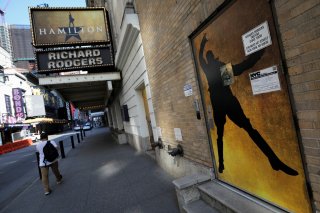How Hamilton Got Millions in 'Stimulus Checks'
Hamilton, which currently has five different productions running in different parts of the world, has sought $10 million in relief for each production.
Hamilton, the Broadway musical that has collected awards, accolades, and money, remains the most popular piece of American theater in the 21st century. It’s also likely one of the most profitable musicals in history.
So why did it receive millions in federal stimulus money?
The New York Times looked at that question Wednesday.
The newspaper reported that Hamilton, which currently has five different productions running in different parts of the world, had sought $10 million in relief for each production.
It’s through something called the Shuttered Venue Operators Grant program, which is meant to help performing arts venues, which were shuttered for more than a year due to the pandemic, get back on stage. It’s mostly aimed at venues and performing arts companies that are in existential danger following a year of being closed.
The Shuttered Venue Operators Grant program was first put in place as part of something called the Economic Aid to Hard-Hit Small Businesses, Nonprofits, and Venues Act, which was later amended by the American Rescue Plan Act. That made $16 billion in grants available to such venues, with the money distributed by the SBA’s Office of Disaster Assistance.
“The practice of separately incorporating touring productions is standard in the commercial theater business, and other shows similarly applied for $10 million in assistance for each production running before the pandemic. But ‘Hamilton’ stands to get the most money because it had the most touring productions,” the Times report said. “As of this week, ‘Hamilton’ has been approved for $10 million each for the Broadway production and two touring productions; it has not yet heard about the other two tours.”
The show’s producer, Jeffrey Seller, gave an interview to the Times about the grants.
“Remember when Chrysler and GM were about to go bankrupt? In the same way that the federal government came in to bail out auto companies, it’s doing the same thing for all of show business with this legislation,” he told the Times. “It’s returning us to health and it’s protecting the well-being of our employees.” He added that none of the money would go to the show’s producers or investors, or be used as royalties.
“‘Hamilton’ has spent many millions of dollars during a time in which it was earning no income,” Seller told the newspaper. “Our goal is for ‘Hamilton’ to be in the same financial position it was in when we suspended operations on March 12, 2020.”
The Shuttered Venues program, per the Times, has also distributed funds to other Broadway entities, including the theater landlords the Nederlander Organization and Jujamcyn Theaters. The touring production of Fiddler on the Roof — whose multi-decade streak of being performed every day somewhere in the world was snapped by the pandemic-received $10 million.
Stephen Silver, a technology writer for The National Interest, is a journalist, essayist, and film critic, who is also a contributor to The Philadelphia Inquirer, Philly Voice, Philadelphia Weekly, the Jewish Telegraphic Agency, Living Life Fearless, Backstage magazine, Broad Street Review and Splice Today. The co-founder of the Philadelphia Film Critics Circle, Stephen lives in suburban Philadelphia with his wife and two sons. Follow him on Twitter at @StephenSilver.
Image: Reuters

